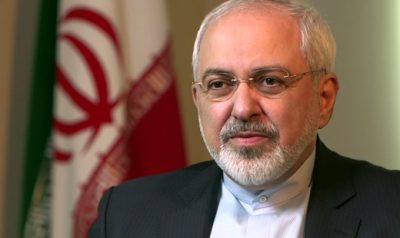Washington’s Bully Tactics Have Failed to Persuade Tehran to Negotiate a New Nuclear Deal
“We will continue to sell our oil, but we will not sell our dignity” Javad Zarif, Foreign Minister of Iran

Iran’s Foreign Minister Javad Zarif is in New York this week for high level talks at the UN. He has been confined to a six-block radius. It’s not uncommon for Iranian diplomats along with envoys from North Korea, Syria and Cuba to be confined to a broader radius of 25 miles.
Zarif’s movements, however, are limited to the UN Headquarters in Manhattan, the Iranian Mission to the UN, and the Residence of the Iranian Ambassador. Even with the restrictions placed on him with a limited visa, he has made time for a few interviews to discuss rising tensions with the United States and the Iran Nuclear Deal or Joint Comprehensive Plan of Action (JCPOA) which President Trump unilaterally withdrew from fourteen months ago.
Last week, I wrote about Iran’s decision to increase uranium stockpiles and uranium enrichment past JCPOA limits. Zarif has stated time and time again that the JCPOA includes legal remedies under paragraph 36 once one side of the agreement starts violating the terms, the other side is “free to start partial implementation”. Zarif has said that this can be reversed within hours.
In an interview with Fareed Zakaria, which will air this Sunday on CNN, Zakaria asked “do you think there could be war between the United States and Iran?” Zarif responded
“We will never start a war, we have never started a war… but we will defend ourselves and anybody who starts a war with Iran will not be the one who ends it”.
In other interviews and statements that Zarif has given recently, he has made it clear that although we are not close to a military war between the United States and Iran the US is presently engaging in an economic war by imposing harsh sanctions under its “maximum pressure campaign” and that these sanctions are affecting the most vulnerable members of Iranian society. Medicine and medical treatment are affected by US sanctions putting women, children, and the elderly at risk.
Zakaria wrote a column last week for the Washington Post titled, “Trump is strangling Iran. It’s raising tensions across the Middle East”. In his article he highlighted the incoherence of the Trump administrations strategy towards Iran, noting the White House News Release which stated that “There is little doubt that even before the deal’s existence, Iran was violating its terms”.
Zakaria also noted the contradiction between Trump saying that he called off military strikes against Iran at the very last minute because he didn’t want to kill 150 Iranians, while simultaneously increasing sanctions which have caused a significant rise in mortality to the tune of over 150 deaths. Zakaria also wrote about the humanitarian crisis that the Trump administration has created in Iran and the geopolitical crisis in the Middle East, without creating a strategy to resolve either issue.
In a series of leaked memos that began about a week ago, UK Ambassador Kim Darroch called the Trump administration dysfunctional and inept. He also alleged that Washington didn’t have a strategy for what would happen following their unilateral withdrawal. In the most recent leaks Darroch says that Trump axed the Iran Nuclear deal to spite Obama. Darroch, who has now resigned as a result of these leaked memos, called Trump’s decision to abandon the international agreement “an act of diplomatic vandalism, seemingly for ideological and personality reasons” because the pact “was Obama’s deal.”
In response to questions about whether Iran will agree to negotiate a brand-new deal with the Trump administration, Zarif has made it clear that Iran is not interested in a new deal. That the JCPOA took twelve years of negotiations, and that it is the best deal that all parties involved can hope for.
In statements made to BBC HardTalk, such as “Once you start accepting illegal demands, there’s no end to it.” And “If you allow a bully to bully you into accepting one thing, you will encourage him to bully you into accepting other things” Javad Zarif, Iran’s Foreign Minister is highlighting Iran’s frustration with the current administration, their bully tactics, and the effect they have had on their European allies who are part of the deal. Zarif has said that the “three European countries” make nice statements, but that these statements do not provide relief for Iran. When asked during interviews about what it would take to find a solution for the deadlock, Zarif has said that all Iran wants is for the implementation of whatever was negotiated under the agreement.
Zarif also stated during the BBC interview with Zeinab Badawi that
“President Trump is being advised by people who are not interested in peace but advancing an agenda that they have had”.
Zarif said that although he doesn’t think President Trump wants to go to war that there are those close to Trump who are “crazy for war” and “thirst for war”.
Iranian officials have made it clear that if Iran wanted to build a bomb it could have already done so, but that they are not interested in building a nuclear bomb. Zarif has asked why Europe isn’t concerned with the fact that Israel has 200 nuclear warheads. The IAEA has made fifteen reports, five of which were after Trump’s withdrawal all proving that Iran has been compliant with the JCPOA terms.
The Trump Administration underestimated Iran’s resistance to foreign domination. Bully tactics have failed to bring about the results they anticipated.
*
Note to readers: please click the share buttons above or below. Forward this article to your email lists. Crosspost on your blog site, internet forums. etc.
This article was originally published on InfoRos.
Sarah Abed is an independent journalist and political commentator. For media inquiries please email [email protected]
Featured image is from ifpnews

